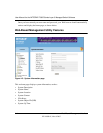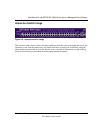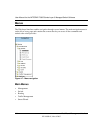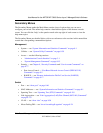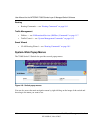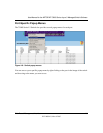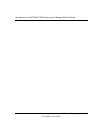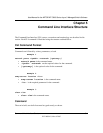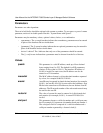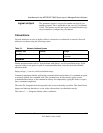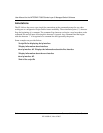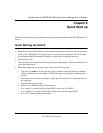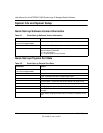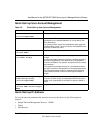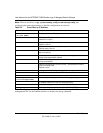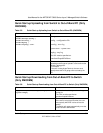
User Manual for the NETGEAR 7300S Series Layer 3 Managed Switch Software
5-2 Command Line Interface Structure
202-10088-01, March 2005
Parameters
Parameters are order dependent.
The text in bold italics should be replaced with a name or number. To use spaces as part of a name
parameter, enclose it in double quotes like this: "System Name with Spaces".
Parameters may be mandatory values, optional values, choices, or a combination.
– <parameter>. The <> angle brackets indicate that a mandatory parameter must be entered
in place of the brackets and text inside them.
– [parameter]. The [] square brackets indicate that an optional parameter may be entered in
place of the brackets and text inside them.
– choice1 | choice2. The | indicates that only one of the parameters should be entered.
– The {} curly braces indicate that a parameter must be chosen from the list of choices.
Values
ipaddr This parameter is a valid IP address, made up of four decimal
bytes ranging from 0 to 255. The default for all IP parameters
consists of zeros (that is, 0.0.0.1). The interface IP address of
0.0.0.0 is invalid. In some cases, the IP address can also be
entered as a 32-bit number.
macaddr The MAC address format is six hexadecimal numbers separated
by colons, for example 00:06:29:32:81:40.
areaid Area IDs may be entered in dotted-decimal notation (for example,
0.0.0.1). An area ID of 0.0.0.0 is reserved for the backbone. Area
IDs have the same form as IP addresses, but are distinct from IP
addresses. The IP network number of the sub-netted network may
be used for the area ID.
routerid The value of <router id> must be entered in 4-digit dotted-deci-
mal notation (for example, 0.0.0.1). A router ID of 0.0.0.0 is
invalid.
slot/port This parameter denotes a valid slot number and a valid port num-
ber. For example, 0/1 represents slot number 0 and port number 1.
The <slot/port> field is composed of a valid slot number and a
valid port number separated by a forward slash (/).



